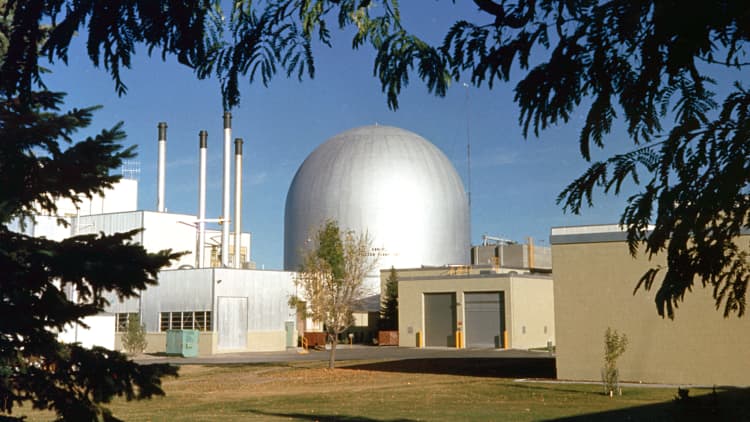Why Silicon Valley is so hot on nuclear energy
The Vogtle nuclear power plant is located in Burke County, near Waynesboro, Georgia in USA. Each of the two existing units have a Westinghouse pressurized water reactor (PWR), with a General Electric turbine and electric generator, producing approximately 2,400 MW of electricity. Two Westinghouse made AP 1000 reactors are under construction here.
Pallava Bagla | Corbis News | Getty Images
Venture capitalists in Silicon Valley and other tech hubs are investing money in nuclear energy for the first time in history. That’s changing its trajectory and pace of innovation.
“There’s not been a resurgence of nuclear power, ever, since its heyday in the late 1970s,” Ray Rothrock, a longtime venture capitalist has personal investments in 10 nuclear startups, told CNBC.
Now, that’s changing. “I have never seen this kind of investment before. Ever.”

Jacob DeWitte, CEO of micro-reactor startup Oklo, says the landscape has changed dramatically since he started raising money in 2014, when he was a part of the Y Combinator startup incubator.
“More investors are interested, more investors are excited by the space, and they’re getting smarter to do the diligence and know what to do here — which is good,” DeWitte told CNBC.
This surge of private investment will be a positive for the industry, agrees John Parsons, an economist and lecturer at MIT.
“I think having fresh perspectives is really good,” Parsons told CNBC. Nuclear energy is “a very complex science, and it’s been supported by the federal government and at these national labs. And so that’s a very small circle of people. And when you broaden that circle, you get a lot of new minds, different thinking, a variety of experiments.
In any industry, there can be a “groupthink” or “narrowness” in the way things are done over time, Parsons said. With private investment in the space, “there will be out-of-the-box thinking,” he said. “Maybe that out-of-the-box thinking doesn’t produce anything useful. Maybe it turns out that the old designs are the best. But I think it’s really wonderful to have the variety of takes.”
Not everyone is so optimistic that the recent influx of venture dollars will lead to progress.
“Investors have often invest in stupid things that didn’t work,” Naomi Oreskes, a professor of the history of science at Harvard University, told CNBC. “Because the reality is that in a 75-year history of this technology, it has never been profitable in a market-based system.” If investors are putting money into nuclear now, that’s because they think they can make money, and “I can only think they believe they will make money because they think that there’s a big opportunity to have the federal government pick up a big part of the tab,” Oreskes said.
Pitchbook’s private investment data for nuclear technology data includes both fusion and fission.
Chart courtesy Pitchbook.
Nuclear investment by the numbers
From 2015 to 2021, total venture capital deal flow in the United States…
